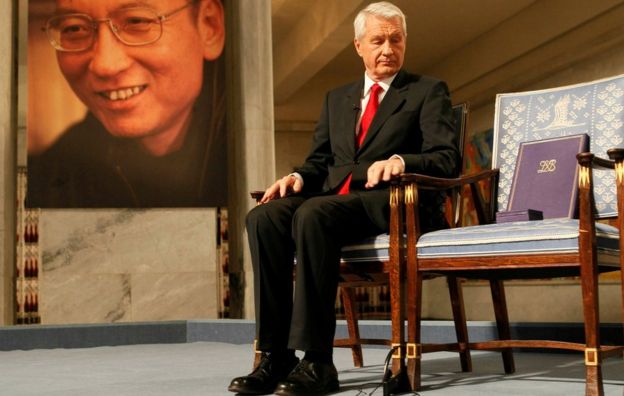Liu Xiaobo: China criticised over late dissident's treatment
The activist, who had been serving an 11-year prison term for "subversion", died in a hospital in China aged 61.
Amid tributes for the late campaigner, the Nobel Committee, which gave him the Peace Prize in 2010, said China bore a "heavy responsibility" for his death.
Beijing is now being urged to free his wife, poet Liu Xia, from house arrest.

While official reaction in China has been restrained, one state-run newspaper accused "Western forces" of politicising the case.
- The man China couldn't erase
- Love that survived a labour camp
- The activist in his own words
Mr Liu had been moved from a prison to a hospital in the north-eastern city of Shenyang last month, where he was being kept under heavy security.
The Chinese government had rejected calls from Western countries to give Mr Liu permission to seek palliative treatment elsewhere, with Chinese medical experts insisting that he was too ill to travel.
However, a German and an American doctor who had recently visited and examined him in the hospital said he would be able to travel abroad.
Mr Liu died "peacefully", surrounded by his wife and other relatives, his main doctor Teng Yue'e said. His final words to Liu Xia were: "Live on well".
In a brief statement, Shenyang local officials said that Mr Liu had suffered multiple organ failure, and that efforts to save the activist had failed.
International powers press China
Calling the death "premature", the Nobel Committee also said the Chinese refusal to allow him to travel was "deeply disturbing".
Germany, which was one of the countries considered as an option to Mr Liu, regretted that his transfer did not take place, Foreign Minister Sigmar Gabriel said.
"China now has the responsibility to quickly, transparently and plausibly answer the question of whether the cancer could not have been identified much earlier," he added in a statement.
The country, alongside the UK, US and France, called on China to allow Liu Xia to travel and leave the country if she wished.
British Foreign Secretary Boris Johnson said in a statement: "Liu Xiaobo should have been allowed to choose his own medical treatment overseas, which the Chinese authorities repeatedly denied him. This was wrong and I now urge them to lift all restrictions on his widow."
The call was endorsed by the UN High Commissioner for Human Rights, Zeid Ra'ad Al Hussein, who urged China to "guarantee Liu Xia's freedom of movement".
Praise has poured in for Mr Liu, with US President Donald Trump calling Mr Liu "a courageous advocate" who "dedicated his life to the pursuit of democracy and liberty".
'RIP' messages deleted
Coverage on mainland China has been muted. Xinhua and CCTV news issued short statements on their English sites stating that Liu Xiaobo, "convicted of subversion of state power", had died.
Communist Party mouthpiece Global Times said Mr Liu was "a victim led astray" by the West.
"The Chinese side has been focusing on Liu's treatment, but some Western forces are always attempting to steer the issue in a political direction, hyping the treatment as a 'human rights' issue," the newspaper added.
Social media users have also noticed attempts from censors to quell reaction online.
Many comments appear to have been deleted, including messages with "RIP" or candle emojis, popular when commemorating someone who has died.
- China media silent on Liu Xiaobo death
- Liu Xiaobo memorialised in social art
- Love that survived a labour camp
Who was he?
A university professor turned tireless rights campaigner, Mr Liu was branded a criminal by authorities, and repeatedly jailed throughout his life.
Liu Xiaobo played a significant role in the Tiananmen Square student protests of June 1989, which ended in bloodshed when they were quashed by government troops.
He was subsequently placed in a detention centre and released in 1991.
Mr Liu's campaign to free those detained during the Tiananmen Square protests landed him in a labour camp in north-eastern China for three years, but he was permitted to marry poet Liu Xia there in 1996.
He was later freed, and continued to campaign for democracy.
The 11-year jail term he was serving was handed down in 2009 after he compiled, with other intellectuals, the Charter 08 manifesto. It called for an end to one-party rule and the introduction of multi-party democracy.
Mr Liu was found guilty of trying to overthrow the state.
[BBC SOURCES]


No comments